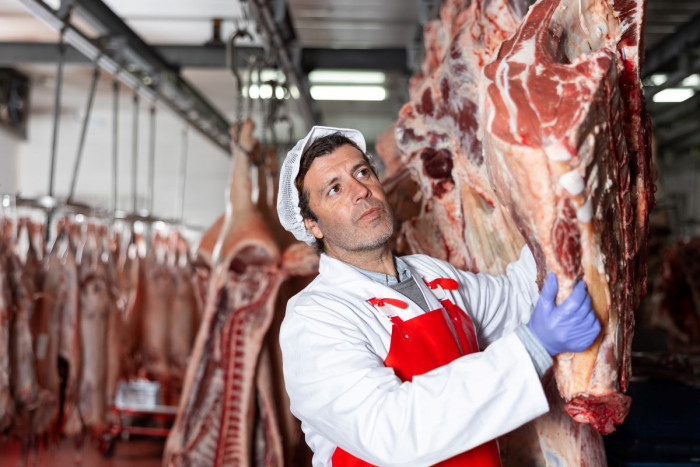Pay
Butchers usually earn
$26-$44 per hour
Source: careers.govt.nz research and Seek, 2023.
Job opportunities
Pay
Pay for butchers varies depending on qualifications and experience.
- Apprentice butchers usually start on minimum wage.
- Butchers usually earn $26 to $36 an hour.
- Experienced butchers and managers can earn up to $44 an hour.
Source: careers.govt.nz research, 2023; and Seek, 2023.
- PAYE.net.nz website - use this calculator to convert pay and salary information
- Employment New Zealand website - information about minimum wage rates
(This information is a guide only. Find out more about the sources of our pay information)
What you will do
Butchers may do some or all of the following:
- break down and bone animal carcasses into cuts of meat
- make mince, sausages and other smallgoods
- help customers choose meat, and give advice about cooking methods
- cure and smoke meat
- sharpen and maintain knives and butchery equipment
- keep the workplace clean and hygienic
- package meat for display
- order and carry out stocktakes of supplies.
Skills and knowledge
Butchers need to have knowledge of:
- different cuts and grades of meat, and how long they remain fresh
- how to prepare and cook different types of meat
- how to safely use knives and other butchery equipment
- food hygiene legislation and regulations.
Working conditions
Butchers:
- usually do shift work, including early mornings, evenings, and weekends
- work in butcher shops or in the butchery department of supermarkets
- work in conditions that may be cold, due to moving in and out of freezers, and hazardous, due to working with knives.
What's the job really like?

Whare Rutene
Butcher
Whare Rutene jokes that he decided to become a butcher because he liked the idea of playing with knives. "But once I gave it a shot I found there's a lot more to it than using knives."
Pre-employment training the first step
Whare's first step in becoming a butcher was completing a pre-employment course in meat retailing. "We learned about the different types of meat and how to break a carcass down into different cuts. We also learned how to use and take care of the equipment, and provide good service to customers."
Getting a job and getting promoted
Whare went on to complete his apprenticeship at a supermarket butchery, and eight months after he qualified he was promoted to assistant manager.
"I've been working as a butcher for six years now and it's really grown on me. I start work at 6am nearly every day, but the good thing about that is I finish early." He says the only thing that might put people off is the cool temperatures in a butchery.
Other than that, he says it's great being a butcher. "I really enjoy the people I work with – they're all good, down-to-earth people."
Whare Rutene is of Ngāti Porou and Tūhoe descent.
Butcher video
Bryce Gyde talks about life as a butcher – 2.18 mins.
Why did I choose this career? Most butchers don't choose this career.
It chooses you. That's the perfectly honest answer.
Hi, my name's Bryce and I'm a butcher.
So the basic gist of my job is I like to cut meat,
like to make sausages and we really like to make beautiful products that people
love to look at. Butchery is not just about cutting meat,
you really have to make stuff that people really want to buy and take it home,
and you have to have something different. I wasn't really an academic at school,
so I got a part-time job at a small butcher shop.
And from there I just started doing more and more hours. And before I knew it,
I was working there full-time. I've been in butchery for 14 years.
Qualified butcher for about 7 years now. So to be a qualified butcher,
you have to go through a 3-year apprenticeship programme,
which I did with Foodstuffs.
So the favourite thing about my job is always being creative,
thinking of new ideas and really pushing the boundaries on what you could do and
what people think meat is. The subjects that I took at school that are relevant
towards my career in butchery is cooking.
You need to know how to cook meat and physical education. These cuts are
extremely heavy, so you have to be strong.
As you are on the job actually cutting you learn very fast where cuts are
situated and how to take them out and how to utilise those the best. So right
here I've got the belly, which has nice amount of fat on there.
We've got the rind on the outside that you get a lot of crackling off.
And then down the bottom we've got the loin.
We don't want to have any waste from any of the meat.
We want everything to be used. For anyone younger who's a bit scared to start
off cutting down the whole carcass:
what I'd say is that when you get started and you watch someone do it,
you realize that it's actually a lot of fun.
And the second you take that first step,
you want to take the next step and the next step and it just gets easier and
easier every single time. This here is a mesh glove, so it protects your
forearm as well, because if you are cutting and you slip,
there's main arteries in there. So this is a very important piece of PPE,
and it's vital to be in this trade to always use this whenever you're using a
knife. It does feel like I'm a knight and it feels like sometimes we go to war,
especially at Christmas time. Get in there, get started.
You'll become the best if you set your mind to it.
Entry requirements
To become a butcher you need to complete an apprenticeship and gain a New Zealand Certificate in Trade Butchery (Level 4). Skills4Work oversees butchery apprenticeships.
Secondary education
A minimum of three years of secondary education is recommended. Home economics (food and nutrition) is useful.
For Year 11 to 13 learners, trades academies and the STAR and Gateway programmes are good ways to gain relevant experience and skills.
These programmes may help you gain an apprenticeship, but do not reduce the amount of time it takes to complete it.
Personal requirements
Butchers need to be:
- careful and safety-conscious
- organised and able to follow directions
- able to use their initiative
- skilled in handling, preparing and presenting meat products
- good at customer service.
Useful experience
Useful experience for butchers includes:
- any work in kitchens
- food hygiene courses
- retail work
- farm work
- work at a meat processing plant or as a meat packer
- work as a clean-up person in a butchery.
Physical requirements
Butchers need to have good hand-eye co-ordination. They also need to be reasonably fit as they often stand for long periods and may have to lift heavy items.
Find out more about training
- Skills4Work
- 0800 2 SKILL - (0800 275 455) - www.skills4work.org.nz
What are the chances of getting a job?
High demand for butchers
Demand for butchers is good because:
- people often leave the role after a short time, which creates vacancies
- the workforce is ageing, and more butchers are needed to replace those retiring
- not enough people are completing butchery apprenticeships.
Chances are particularly good for halal butchers (who kill and prepare meat in accordance with Islamic customs), as there is a shortage of people trained in this area. As a result, employers are hiring halal butchers from overseas to meet demand.
Halal slaughterer (butcher) appears on Immigration New Zealand's Green List. This means the Government is actively encouraging skilled halal slaughterers from overseas to work in New Zealand.
According to the Census, 4,152 butchers worked in New Zealand in 2018.
Types of employers varied
Butchers can work for:
- retail butchers
- wholesalers
- supermarkets.
Some butchers may own and work in their own butchery.
Sources
- Competenz website, accessed June 2018, (www.competenz.org.nz).
- Hutching,G, 'The World is Eating More Meat, Not Less and That's Set to Continue', 20 February 2018, (www.stuff.co.nz).
- Immigration New Zealand, Transport Sector Agreement Finalised and Green List Changes Confirmed, 26 April 2023, (www.immigration.govt.nz).
- King, H, 'The Average Kiwi Eats 20kg Less Red Meat Amid Concerns over Sustainability of Agriculture', 4 February 2018, (www.stuff.co.nz).
- Meat Industry Association, 'Meat Industry Association 2017 Annual Report', 2017, (www.mia.co.nz).
- Ministry of Business, Innovation and Employment, 'Annual Percentage Change in Advertised Job Vacancies, March 2017 to March 2018 Quarters', 27 April 2018, (www.mbie.govt.nz).
- Ministry of Business, Innovation and Employment, 'Investor's Guide to the New Zealand Meat Industry 2017', 2017, (www.mbie.govt.nz).
- Ministry of Business, Innovation and Employment, 'Occupation Outlook – Butchers', accessed 2018, (www.mbie.govt.nz).
- Robertson, H, training manager butchery, Foodstuffs North Island, careers.govt.nz interview, June 2018.
- Stats NZ, '2018 Census Data', 2019.
(This information is a guide only. Find out more about the sources of our job opportunities information)
Progression and specialisations
Butchers may progress to own and work in their own butchery, or manage a supermarket butchery department.
Last updated 9 December 2024


